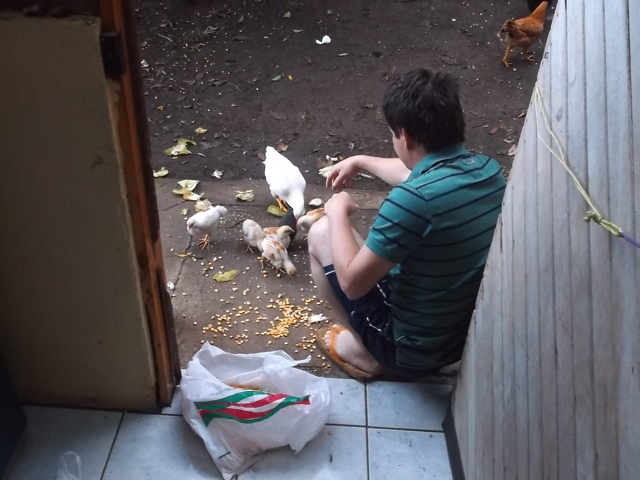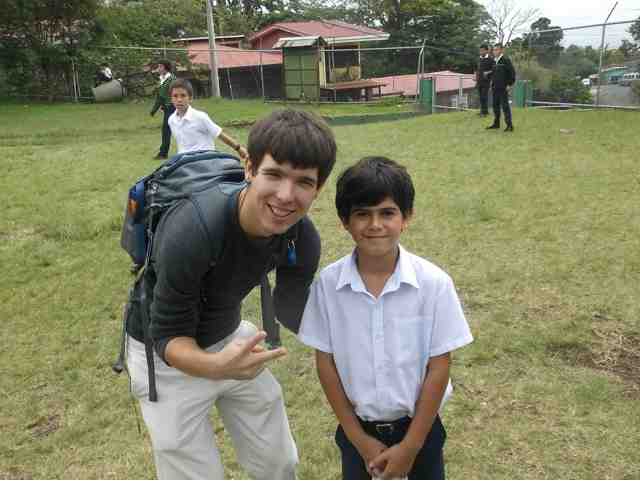I have been back in the States for 4 days now. Since my return back I have been trying to catch up on sleep and get mentally fit again. Needless to say being able to sleep for 10 hours and not be woken up by a rooster has done wonders. I have notice I've been having a little reverse culture shock right now. From getting used to American food to conversational skills. I've noticed that I still say "con gusto" to everyone that says thanks to me. Not to mention change of pace feels different in the states, even in the South. Despite all these things I feel that I brought a lot back with me that's really positive. But before I get to that I'm going to host an "exit" interview with myself first.
1. What were your goals for this trip and discuss if and how you met your goals?
Original Goals
- Acquire enough Spanish to hold a conversation; which I can build upon in the States
- Try a lot of yummy Latin Food
- Don't get sick eating said yummy Latin Food
- Talk to all the locals I can
- Enjoy being with the host families; maybe they'll teach me how to play futbol
- Understand more about the culture within Costa Rica
- Understand more about the different geographical features of Costa Rica
- Become one with the locals
I have to say that I completed 95% of these goals. The only ones I failed at were getting sick (not sure if food or water, but most likely water) and learning futbol. I did get embarrassed by a 6 year old playing futbol; somehow I don't think that constitutes as learning how to play futbol. The other goals I did meet. And a lot of it has to do with just being willing to converse with others. Like my mantra says at the beginning of this blog, "just keep babbling." Through that mantra I was able to feel confident in practicing the language and talk to a lot of locals. Thus gaining the skills to hold a simple conversation by the end of the trip. Not to mention my host families helped me in the process by inviting me into their lives and wanting to share the culture with me. I don't know if this made me one of the locals, but I definitely felt like I could fit into most places simply from wanting to try new things. Lastly, all our tours and our guides provided me with a lot of information about Costa Rica as whole.
2. Reflect on your significant experiences and why these were significant to you.
a) The first significant experience I had was having a home-stay. As I've stated before I've never done a home-stay and was unsure of what to expect. But that home-stay aspect was the greatest thing about this trip. I learned how to speak the language, family dynamics, culture, and how genuine kindness goes a long way. This was highly significantly for me for a few reasons. The first is that by living with the family I can get a sense of what my students may have experienced in their native country and/or currently. Following that up I feel much more comfortable connecting with future families of students. Lastly, I have verified to myself that I could live in another country for a year if the opportunity arose.
b) The second significant experience was taking a Spanish class in Costa Rica. I felt more like an ELL in a academics setting then when I was in Rome. At least in Rome my teacher spoke English fairly well. In Costa Rica it was hit or miss with the teachers. Some knew a little, others not as much, and some knew but didn't want to use it. Not to mention the structure of the program made me think about my own classroom. Struggling to understand simple instructions (both written and verbal). Dealing with inconsistent balance between grammatical aspects and conversational. Also not understanding why either one was the focus of the class. Then adding in the fact my native language was not allowed in some of the classrooms was a frustration. On the positive spectrum I acquired some new games and maniplatives to use. As well as understanding the value of just being able to understand a student's L1 and having a positive vibe. The reason these things are significant goes beyond just me being a future ESL teacher. But being able to convey this knowledge to my future co-workers as well. The ones I would want to stress to others is having instruction available in L1 (or at least key words) and just being genuinely caring with these students.
c) The third significant experience was being able to go into the schools. I really got to see what resources and types of teaching students are exposed to in the area. This background knowledge I acquired will help me in my future classroom significantly. For instance in Costa Rica students don't have textbooks. So if I had a student from that area I may need to show how the textbook is laid out and stress that its something that's needed for class. From a teaching methodology standpoint the student will have been exposed to more teacher-direct lessons. It may take awhile for the student to get used to being at the forefront of learning. By going to the schools it was just great to just work with the kids in general. They loved having us there, it was like having a brand new friend!
** Everything was significant these are just the top three**
3. What have you learned about ELLs, special needs children and struggling learners that you can now apply to your classroom?
Everything in the last question applies to what I learned about ELLs. But here are some additional things that shouldn't be forgotten.
- A great way to get a child to open up is to put out some color pencils and paper
- Using manipulatives makes learning fun and creates additional schema
- Start with the student talking about topics their comfortable with and expand on those topics
4. What significant and potentially life-changing things have you learned about yourself?
- I can live in another country. I've wanted to teach abroad for over a year now. By having this experience I was able to verify that I could live in another country. Solidifying coping strategies and developing more personal knowledge of the immersion cycle.
- If there's a will, there's a way. Whether its stepping into a home-stay for the first time or conquering your fear of ledges having a strong mental will makes a big difference. By having a positive attitude and reminding myself of why I was on this trip helped get over the hurdles along the way.
5. If you could begin the trip all over, what would you do differently?
- Smaller group. With having a big a group it takes more time to get around and get organized. Also people will tend to get disengaged during certain activities just from not being able to get close enough to the guide.
- More time in the public schools. I understand that organizing these things is tough. But I feel that those experiences in the classroom are so valuable to future teachers.
6. Would you now choose to work in a school with high poverty and/or English language learners; why?
I have wanted to work with ELLs for several years now. This experience just made me appreciate what I'm doing even more and made me a better teacher of these students. Taking the time to understand not only language but culture too. I want to establish in my classroom a sense of community by incorporating all my students cultures into the classroom.
7. What advice do you have for people considering this study abroad experience in the future?
This experience was pretty awesome. But there are some things that future study abroad participants should know about this particular trip.
- Download the Spanish-English dictionary app on your phone. This will give you a handy way to communicating with your host family quickly and not have to deal with awkward pauses by using a big dictionary.
- Bring a filtered water bottle. The water is generally good in Costa Rica, but there's always a slight chance. Nothing ruins a trip like getting sick from something that could have been prevented.
- If you have an iPad bring a functional sd card adapter. I bought a cheap one and it broke. For the rest of the trip I had to go through an annoying process to upload pictures. Spend the extra money for something reliable.
- Have a support team. You're going to get frustrated at some point. This is just a reality of the immersion cycle. Whether you form a bond with a fellow student on the trip, scheduling communication with family, or just talking to the local stray dog. Just having someone there to listen and help you process goes a long way.
- Go in with the right attitude. This trip is not a vacation; yes we did get to go on trips on the weekend. But overall this trip is meant for you to immerse yourself in the culture and experience the stresses of an ELL student. There were people who went on this trip thinking it was all a vacation and they burned out really quickly and some never recovered. This trip means so much in terms of becoming a better teacher. Like the saying goes, "You get as much as you put into it."
- Be prepared for culture shock. Culture shock is very real and happens in various degrees. Sometimes it may just be social norms other times it can come in form of living conditions. The more you know ahead of time the more you can be prepared mentally.
8. How would you assess your overall experience?
Overall I really enjoyed this experience. I grew in a lot of different ways and would vouch for others to go on this trip. For me personally this trip was all about the cultural immersion and acquiring some Spanish. I didn't get as much out of the class as I would have liked, but then again my field of study is ESL and the class was geared towards mainstream teachers. I went in with a pretty good mindset to just dive in and experience as much as I could. From that I was able to push through the lows and the frustrations that trip/immersion cycle brought. Something that I would love to pass onto my students; positive mental attitudes. I was glad that a lot of mainstream teachers went on this trip. In my ESL classes we always talk about promoting knowledge about ELLs to our fellow teachers. This experience definitely helps that and I think helps break down a lot of barriers. Now when I share with my future school I can share personal knowledge not just book knowledge. With ELLs being close to one-third of the nationwide school population teachers in all fields need to acquire some knowledge of ELLs. This trip provides that and I would promote any trip whose focus is immersion for future/current teachers. I thought the extra trips were also chosen pretty well. I really enjoyed El Trapiche, La Paz Waterfall Gardens, and the zip lining. Each one allowed us to learn something new about Costa Rica or ourselves. I have to say that without this trip I would not have discovered the Cloud Forest School. A school that I will most likely apply to in the upcoming year!
Look out for my new posts on Panama! Coming in December.


















































